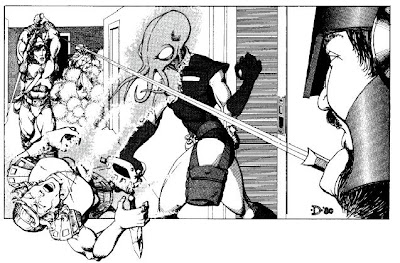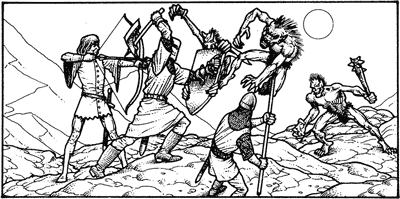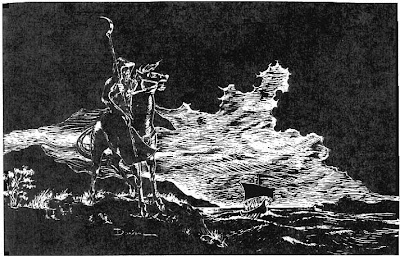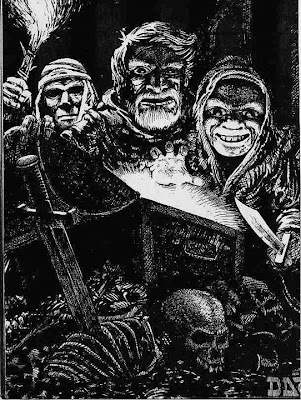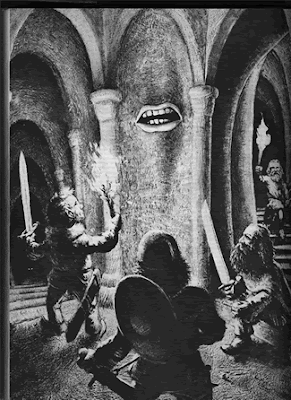Everyone's got their own way of running games. Here is how I generally handle things these days, and how I will handle them in the future, in my AD&D 1E and BFRPG games:
The dice are God, carrying more authority than any player and carrying more authority than the guy running the game. Just picking up the dice is a sign that nobody at the table knows what's going to happen. No fudging. Ever.
If a "story" would be ruined by an "incorrect" roll of the dice, then we're playing wrong. The story is only apparent after the playing is done. It's not a goal in-game. Sort of. More on that later. But if I want something to happen, then I'll say it happens and not bother with a dice roll. I'm in charge only to the point that I pick up the dice. Then I'm not in charge anymore.
I make almost all my rolls out in the open. I have a referee's screen (or sometimes just a clipboard), but that's mainly for hiding maps and location notes. There are only a few rolls that I make out of sight of the players:
Searching for secret doors. Sure, they may miss something (and I've driven players nuts when they don't know where else to go), or they may search for a million years because they're sure something is there when there is not, but they'll never know because they never see the roll.Searching for traps. This will change... it is a ridiculous drain on play flow to stop at every door and every little thing and make people say, "I'm listening at the door." "I check the chest for traps." My new way of doing things is that they never have to say they are doing these things. It will be assumed. When someone says, "I open the chest," if there is a trap there, the thief gets to roll to see if he found it ahead of time. But someone has to commit to the deed before this happens. "I open the chest." "Thief, roll your find traps." "Damn! Failed!" "umm, wait, no, I'm not opening the chest after all." haha, the hell you aren't! :P Now if there is a suspicious setup and the thief wants to check something before anyone commits to anything, then I make that roll. I also like the ideas floating around the net right now about not hiding any traps, and instead putting them in plain sight and making the players puzzle through them. I'll do some of that too.Move Silently/Hide in Shadows. But only if failure isn't immediately obvious. "I hide in shadows to set up a backstab next round!" might as well be a roll made by the player, as he's going to know right away if it worked or not. I use the Burning Wheel "Let it Ride" principle as well - one roll is made and stays in effect until circumstances change. No 'making a roll for this room... you're not noticed. And into that room, another roll..." No.Wandering Monsters Checks. There is a penalty for sitting in a room and checking every square inch of wall for secret passages, and wandering monsters are that penalty. Adventuring environments are dangerous. There's the argument that "random encounters weaken the party too much for the real encounters!" Ah boo hoo. Reaction rolls. Sometimes it's obvious how someone feels about you, but sometimes it isn't. Did I miss anything?
All monster attack and damage rolls are done in the open. Sometimes I make the player roll for their own misery. "Roll d4 to see how many of these things attack you this round."
The dice are really unforgiving, too. Lately there have been multiple character deaths every session. It's low-level play, so no bother. The players cheer upon leveling, I tell you that.
... funny story... I got a bit busy and unable to prepare the weekly sessions, so I set up a "magic portal" that everyone went through... so week to week we're rotating GMs, as the characters pop out of the portal in different places. And I get to play, yay! It was noted that I do absolutely everything I can to make sure the dice are not rolled in combat... I'll go to any means to avoid a fight as a player, because fights are deadly, and I like the idea of keeping a guy alive. "Let me tell you about my character..." My guy's unwillingness to fight ended up getting a fort full of bandits to empty out and chase a caravan that didn't exist, so we could search their place. My guy took prisoners because there was no reason to kill those few left behind. My guy died falling into a pit when we missed the "sword's arm" clue about going down the right-hand passage. The GM laughed maniacally because I had established my character as left-handed so I had no chance to get the clue. (he was running from a published adventure, it's not like he was a dick to mislead me based on handedness... on purpose, anyway).
OK, maybe only a funny story to me. But "Let me tell you about my character" shouldn't be annoying. Well, not in moderation anyway. Telling stories about what we actually do in this hobby shouldn't be a bad thing, should it?
Anyway.
I like low-level play and magic-poor worlds. I give out as much non-combat magical treasure as I can when it is time to give up the goodies. But I always screw it up. Last campaign, I goofed it up by running Keep on the Borderlands as-is. Another monumental goof was confronting the players with a main villain early on, and equipping the guy to be able to get away. He didn't get away. He didn't keep his equipment. They didn't kill him though, and he ended up being a thorn in their sides for a long time afterwards. (another goof... I gave the group a Wish scroll, because one of the dwarven characters had hit their level limit and I allow a wish to raise the limit by one level. (per wish) The bastards swerved me by instead wishing for the Dwarven Thrower that they knew one of the villain group possessed. I bet the look on my face was priceless.
But even though these two items disrupted my plans, I went with them. The players are allowed to get one up on me, they're allowed to completely trash my "plans." Because we have no pre-set story. I know what will happen if the players take my "nudge nudge" clues, and they know they should be sporting and not say "Fuck off, we're heading to the east out of the country" for absolutely no reason at all at the beginning of a session. Generally when we finish something at the end of the session, I'll ask them what they're wanting to do next time. I always trail all sorts of little adventure hooks. They'll tell me what they want to do, and then I can prepare the adventure based on their wishes, and I can decide what events happen because they do that instead of these other things. If they want to say "Fuck off, we're heading east out of the country," at the end of a session, I'll put it together for them, without trying to steer them back to my glorious campaign plot cycle (OK, I'll try... "The little girl cries, telling how she's an orphan because of the great evil you're fleeing from." But they are under no obligation to comply.) And none of this "The adventure will happen on the road no matter which way the characters end up traveling." That's just bullshit if they're specifically trying to get away from the adventure. I mean, setting up a "... and at the next inn..." adventure is valid, but if the players figure something's up and just move on, don't throw flying monkeys at them until they return to the inn for shelter, and don't make the adventure happen at whatever inn they stop at next if they already avoided it.
That's another thing. Avoidance. I set up a lot of encounters that the PCs can't possibly defeat in combat. Hell, at 5th-6th level they were running a gauntlet of goblins mounted on dinosaurs to get into a city of the dead in order to steal a lich's treasure... and ended up involved in a web of intrigue between Githyanki, drow, and illithid that were trying to get the Dead King on their side. Could our fearless players have openly confronted any of these factions? Hell no. And it worked because my players knew I'd have no problems slaughtering their characters and using their skins as a drow war banner. But they decided to go there because that specific treasure would help them in defeating this other enemy... but in traveling here to do that, they were absent while another force took control of their home area, so when they got back everything was a mess...
I also allow characters to utterly fail. Protect the mayor of the town? OK Whoops, the assassins got him! ha ha! And then what happens as a result of that is indeed different based on whether the guy got killed or not. There's no expectation of success or failure.
Not that this means I'm continually kicking my players around or that it's a antagonistic stance at the game table. I just set things up as makes sense to me at the time, and in play I just play whatever NPC or monster to their fullest ability. A smart, experienced assassin isn't going to make stupid mistakes and a lax party isn't going to be successful at playing bodyguard. That demon you let out of its magic prison is going to fuck you up (Why did you do something stupid like that for? Released a demon? ay ay ay... :P ), and of course those low hit point wizards are going to die when they flee together, and then the thing teleports away from the general melee to cut these guys off. But they have every chance of success as well, and I'm not here to present a tragedy either. Even handed, with no interest in the outcome, that's my goal.
Not that I always stand behind that. The last full dungeon I ran had a big tomb treasure that was the ultimate goal. The tomb had two false bottoms. The PCs found only one, so they left the dungeon thinking they weren't getting any loot. There was a very real danger that the players were going to think I was just fucking with them for the past two or three sessions, however long this dungeon took. So I compromised. I had a 'tweener (neither friend nor foe) NPC show up and offer clues to the tomb's treasure... for a price. Half of everything they take out of there. They were still pretty pissed when they figured out what they missed, and hated giving over half of it, but they at least got something and as players knew I didn't just run them through a decent sized crawl that had no point and no reward in the thing.
This is turning into more of a "Let me tell you about my campaign..." than a focused blog about how I run games, isn't it?
Eek.
Wake up! More procedural stuff now!
Ability scores in my current BFRPG campaign... 3d6 down the line, exchange two scores with each other if desired... ability score bonuses must add up to more than the penalties. It's resulted in characters that have multiple bad scores with penalties. Players hate it when they have AC and damage penalties. :D But everyone starts with the same chances.
I require players to keep track of encumbrance, but I'm really bad at checking up on them, and I'm sure they don't bother to figure out if they can fit all that stuff into that backpack and one sack they have. (and where is that sack, if you're also carrying a shield and a sword AND a torch?) I should keep better track of torch use and duration. Little details.
And dammit, it's 4am, and I'm rambling... badly. See you tomorrow. Let me know if there's anything in particular you want me to talk about. That'll help me stay focused!






